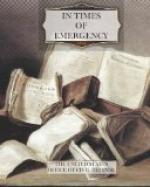Don’t drive unless necessary, and drive with caution. Watch for hazards to yourself and others, and report them to local authorities.
Write, telegraph or telephone your relatives, after the emergency is over, so they will know you are safe. Otherwise local authorities may waste time locating you—or if you have evacuated to a safer location, they may not be able to find you. (However, do not tie up the phone lines if they are still needed for official emergency calls.)
Do not pass on rumors or exaggerated reports of damage.
Follow the advice and instructions of your local government on ways to help yourself and your community recover from the emergency.
* * * * *
CHAPTER 2
FLOODS AND HURRICANES
In addition to the general guidance in Chapter 1 of this section, there are certain emergency actions particularly associated with major floods, hurricanes, and storm tides or surges. These types of disasters usually are preceded by extended periods of warning. People living in areas likely to be most severely affected often are warned to move to safer locations.
EVACUATION
If you are warned to evacuate your home and move to another location temporarily, there are certain things to remember and do. Here are the most important ones:
* FOLLOW THE INSTRUCTIONS AND ADVICE OF YOUR LOCAL GOVERNMENT. If you are told to evacuate, do so promptly. If you are instructed to move to a certain location, go there—don’t go anywhere else. If certain travel routes are specified or recommended, use those routes rather than trying to find short cuts of your own. (It will help if you have previously become familiar with the routes likely to be used.) If you are told to shut off your water, gas or electric service before leaving home, do so. Also find out on the radio where emergency housing and mass feeding stations are located, in case you need to use them.
* SECURE YOUR HOME BEFORE LEAVING. If you have time, and if you have not received other instructions from your local government, you should take the following actions before leaving your home:
—Bring outside possessions inside the house, or tie them down securely. This includes outdoor furniture, garbage cans, garden tools, signs, and other movable objects that might be blown or washed away.
—Board up your windows so they won’t be broken by high winds, water, flying objects or debris.
—If flooding is likely, move furniture and other movable objects to the upper floor of your house. Disconnect any electrical appliances or equipment that cannot be moved—but don’t touch them if you are wet or are standing in water.




